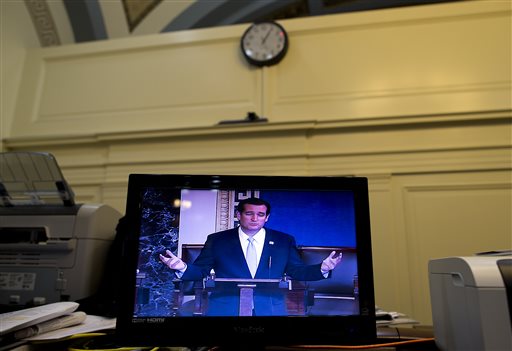The pundits in D.C. jeered as Sen. Ted Cruz (R-TX) began his lengthy speech (a “fauxlibuster,” they joked) on Tuesday. Some cast it as a self-serving gesture, done to impress “dumb” people outside the Beltway who don’t get that defunding Obamacare just isn’t possible. But as the night wore on, it was clear that Cruz’s stand was as passionate and articulate an attack on Obamacare and a defense of liberty as the nation has ever seen.
A few even began to see its wisdom, circulating an essay by David Frum acknowledging that even a defeat served Cruz’s political purposes. Charles Krauthammer, who the day before had traded jokes about Cruz’s Canadian birth, acknowledged on Tuesday that he had executed a brilliant maneuver, if not to defeat Obamacare than to highlight its flaws, and to seize the mantle of leadership of a conservative movement needing inspiration.
What was most impressive about Cruz’s gambit, however, was not the strategy but the substance. In plain language, Cruz laid out the fundamental problems with Obamacare as policy, outlining the cost to working families in higher insurance premiums, dropped health plans, and lost work hours or job opportunities. He also reminded Washington of how the bill was passed, and upheld, in defiance of the people and the Constitution.
A few Democrats eventually wandered down to the Senate floor to debate Cruz, some to try poking holes in his arguments, reminding him that President Barack Obama had won a new mandate from the voters even after passing the Affordable Care Act. Cruz patiently, and deftly, handled their objections, noting that even the unions were turning against the law, and blasting both sides for approving congressional exemptions from it.
It was also difficult not to be moved by Cruz’s passion. No empty gesture could sustain the hours upon hours of explication, analysis, and debate that Cruz tackled on the Senate floor. Agree or disagree with his decision to force the issue into a debate over the budget and the debt ceiling, it is impossible not to be impressed by his sheer will, and by the self-evident sincerity of a man so fluent and ardent in his arguments.
It occurred to me that when I ran for Congress in 2010, and voters would urge me to “do something” if I got to Washington, that this is the type of “something” they meant. They know that a freshman in Congress is barely even worth his or her vote but that a person willing to take risks can change history. And millions went to bed last night knowing someone on Capitol Hill was, finally, keeping watch over their liberty as they slept.
There was one flaw in Cruz’s approach, however. It became clear in the reactions of those who might otherwise have supported his effort but were put off by his attacks on fellow Republicans. Cruz sometimes turned sincere disagreement over tactics into differences in courage and conviction. Despite Cruz’s moderate demeanor, his rhetoric sometimes reflected a political media culture mired in the language of absolutes.
Cruz has withstood intense hostility with uncommon grace, but he should reserve terms like “surrender caucus” and Neville Chamberlain analogies for real enemies if he wants to rally the broader support he deserves. Overall, however, his stand was brilliant. His remarks should be printed separately as a primer on Obamacare, and his tactics should inspire the opposition. He will soon run out of time. But he has turned the tide.

COMMENTS
Please let us know if you're having issues with commenting.